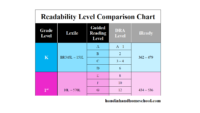FUN FACT: Most good readers actually skip over about 30% of the words their eyes see on a page – yet they still come away with understanding what the text says.
Decades of eye-tracking and reading ability studies tell us that children and adults learn to skim over certain words on a page. It’s usually the small and high-frequency words that our eyes pass over, while seeking out and fixating on the less common words we need to register in our minds.
Not all word skimming falls within the range of normal reading behavior, however. When we listen to a child read aloud, we can identify miscues – those instances when a child leaves out a word or changes it in some way – in order to better understand the nature of a reading struggle.
Identifying and tracking miscues is an important step in determining if a child needs targeted reading instruction or if they may have a reading disability. Below is a short list of common reading miscues and what they may tell you about a child’s reading ability.
| Substitution: Letters within the word | |
|---|---|
| Original Text: | The boy sat on the chair. |
| Miscued Reading: | The boy sit on the chair. |
| What’s Happening: | Substituting SIT for SAT changes the verb tense from past to present, but leaves the essential meaning of the sentence unchanged. |
| What It Tells Us: | The child may need help with slowing down their reading rate to make sure they’re reading each word correctly. If this type of substitution error happens frequently, the child may have a slight problem with visual discrimination skills and noticing small details. |
| Original Text: | The boy sat on the chair. |
| Miscued Reading: | The boy set on the chair. |
| What’s Happening: | Substituting SET for SAT changes the meaning of the sentence. |
| What It Tells Us: | Within-word letter substitutions can occur with the first letter, the ending letter chunk, or the middle vowels of words. This may be an indication that the child may not have learned the letter-sound correlation correctly and simply needs a bit of reteaching. If the problem is a retrieval error, the child will need extra practice to over-learn the letter-sound pair. |
| Substitution: Different word | |
|---|---|
| Original Text: | The automobile parked next to the truck. |
| Miscued Reading: | The car parked next to the truck. |
| What’s Happening: | Substituting CAR for AUTOMOBILE does not change the meaning of the sentence. |
| What It Tells Us: | When a child substitutes synonyms within a sentence, it suggests the child is likely using picture or context clues to figure out an unknown word within a text. Most likely, the child has adequate comprehension skills but needs to add new vocabulary to their personal reading list. When substitutions do not make sense, more attention may need to be paid to fluency and comprehension skills. |
| Original Text: | The automobile parked next to the truck. |
| Miscued Reading: | The automatic parked next to the truck. |
| What’s Happening: | Substituting AUTOMATIC for AUTOMOBILE makes the sentence unintelligible. |
| What It Tells Us: | When a child correctly identifies the beginning sound of the word, such as “AUTO”, we can tell the child has partial decoding skills, but we’ll need to figure out where the reading breakdown is. It’s possible the child retrieved the wrong word in their rush to read. Alternatively, the child may be over-relying on whole word reading and needs help with improving decoding skills. |
| Omission | |
|---|---|
| Original Text: | The cat jumped up on the table and drank my milk. |
| Miscued Reading: | The cat jumped on the table and drank my milk. |
| What’s Happening: | Omitting UP does not change the meaning of the sentence. |
| What It Tells Us: | If the omissions happen infrequently and do not change the meaning of the sentence, then this most likely is a normal reading behavior. |
| Original Text: | The cat jumped up on the table and drank my milk. |
| Miscued Reading: | The cat jumped up on and drank my milk. |
| What’s Happening: | Omitting THE TABLE leaves out critical information of where the cat jumped – my lap, the counter, or the table. |
| What It Tells Us: | You’ll need to probe to find out if the child skipped the word because they couldn’t read it, they were reading too fast and didn’t notice the word, or if eye tracking issues are effecting reading ability. |
| Insertion | |
|---|---|
| Original Text: | The tall man picked an apple from the tree. |
| Miscued Reading: | The big, tall man picked an apple from the tree. |
| What’s Happening: | Inserting BIG to the sentence changes the meaning because a “tall man” could actually be quite skinny – and that could affect understanding the text later on in the story. |
| What It Tells Us: | Inserting words could reflect a child’s powerful schema – their understanding of a category of information. Schemas are important to reading comprehension because they make it easier to understand storylines and predict outcomes. But, schemas also need to be flexible so a person can learn new concepts. |
| Transposition: Letters within a word | |
|---|---|
| Original Text: | The black spider spun its web at night. |
| Miscued Reading: | The balk spider spun its web at night. |
| What’s Happening: | Switching the letters “L” and “A” within the word BLACK to make it the word BALK |
| What It Tells Us: | Analyzing transposition patterns within reading and spelling errors will help to determine if the problem may be a lack of phonics instruction, a memory processing retrieval problem, or a visual tracking issue. |
| Transposition: Whole words | |
|---|---|
| Original Text: | “Here you go,” said John. |
| Miscued Reading: | “Here you go,” John said. |
| What’s Happening: | Switching the order of SAID JOHN does not change the meaning of the sentence. |
| What It Tells Us: | A transposition error, such as this example, most likely indicates a person’s rote reading of basic words that are oftentimes switched up in stories to make the text less repetitive, but otherwise do not affect sentence meaning. Other types of word transpositions may actually change the meaning of the sentence and could indicate a need to reteach syntax and grammar skills or rule out visual tracking issues with an eye doctor. |
This list of Reading Miscues offers just a few general possibilities of underlying issues that may be affecting a child’s reading comprehension ability. For more information on identifying a possible reading disability schedule a remote conusltation today to discuss your full concerns.
Last modified on September 5, 2023




